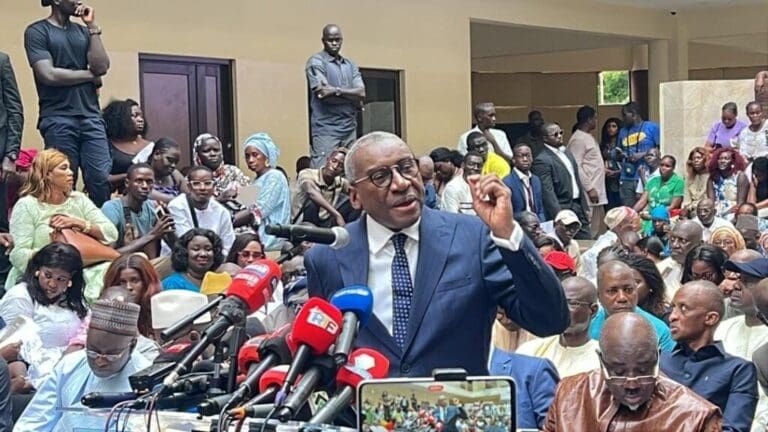Under scrutiny from the new Senegalese authorities regarding his socio-political record and management of public funds, former President Macky Sall (2012-2024) has found staunch defenders among his party members. During a ceremony held at the headquarters of the former presidential party, they presented a 200-page document entitled “Macky Sall: 12 Years Leading Senegal,” which highlights the significant achievements of their former leader.
According to APR officials, Sall’s presidency was marked by notable growth, social inclusion policies, and territorial equity aimed at fostering an emerging Senegal. “The Emergency Community Development Program (PUDC), the Family Security Scholarship Program, Universal Health Coverage, and youth employment initiatives are key social indicators of President Macky Sall’s leadership,” said Seydou Gueye, the party’s spokesperson. He characterized Sall as “a scientist with political values rooted in solidarity and sharing, two foundations of stability and lasting peace.”
Several former dignitaries of Sall’s regime, including former ministers Sidiki Kaba and Aissata Tall Sall, took the opportunity to remind party members of their leader’s legacy, asserting they should take pride in his record while he resides between France and Morocco following his departure from office on April 2.
Potential Parliamentary Changes? The APR, the leading party in the former presidential coalition Benno Bokk Yakaar (BBY, United in Hope), is poised to potentially lose its majority in the National Assembly. This follows the Head of State’s recent proposal to dissolve the Economic, Social and Environmental Council (CESE) and the High Council of Local Authorities (HCCT). Observers suggest that abolishing these two budget-consuming institutions could be a preliminary move toward dissolving the current legislature, which is largely dominated by BBY representatives.
According to Ousseynou Ly, an advisor to President Bassirou Diomaye Faye, the Constitutional Council has informed the President that he could dissolve parliament as of September 12, two years after its formation, and call for new legislative elections within three months. This evolving political scenario could significantly disadvantage Macky Sall’s party, which has already experienced defections among activists five months after losing power and the defeat of former Prime Minister Amadou Ba, BBY’s candidate, in the first round of the last presidential election.
On July 13, President Faye addressed local media during his first 100 days in office, stating that “economic indicators were in the red” upon his assumption of power, and lamenting a lack of funds in the “slush fund.” This discretionary fund, reportedly amounting to billions of CFA francs and allocated annually to the presidency, suggests that his predecessor, Macky Sall, may have depleted it within three months.
First Commitments and Reforms
However, President Faye asserted that his administration has managed to tighten its fiscal policies to fulfill essential commitments to the population, notably by lowering consumer prices. He pointed out that impending power cuts were on the horizon due to unpaid debts to hydrocarbon suppliers, necessitating the creation of strategies to reassure these partners.
“We have reallocated financial resources based on priorities to reduce the cost of everyday consumer goods,” stated the 44-year-old leader, who has published several reports from key oversight bodies that Macky Sall allegedly sidelined during his term. These reports outline mismanagement of public funds by officials from the former regime.
With demands for accountability from the public, President Faye recently appointed new judges, including members of the national financial prosecutor’s office, which replaces the Court for the Repression of Illicit Enrichment (CREI).
Dismissive of any notion of revenge, the Senegalese president affirmed that justice will be served concerning the embezzlement of public funds, land grabbing, and the fatalities that occurred during the violent protests leading up to his party’s rise to power, which left nearly 80 victims.
ODL/ac/Sf/fss/abj/APA


